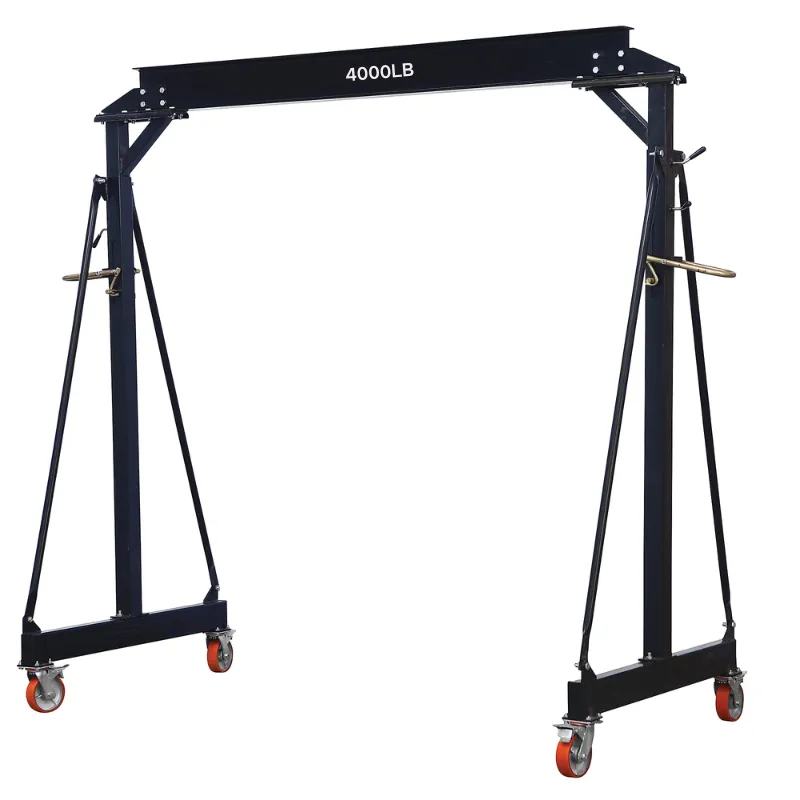Steel Gantry Crane Design and Applications for Efficient Material Handling Solutions
Exploring the Advantages of Steel Gantry Cranes
In today's industrial landscape, efficiency and safety are paramount. One of the most effective solutions for lifting and moving heavy materials is the steel gantry crane. These cranes are versatile, durable, and have become an integral part of many manufacturing and construction environments. In this article, we will explore the characteristics, advantages, and applications of steel gantry cranes.
What is a Steel Gantry Crane?
A gantry crane is a type of crane that runs on a set of rails or wheels mounted on a framework. The entire structure is supported by legs that allow it to straddle the work area. Steel gantry cranes, as the name implies, are constructed primarily from steel, providing them with exceptional strength and stability. Their design typically features a horizontal beam supported by two or more vertical legs, enabling them to lift and transport heavy loads with ease.
Advantages of Steel Gantry Cranes
1. Durability and Strength Steel is known for its high tensile strength and durability, making steel gantry cranes exceptionally robust. They can handle heavy loads consistently without compromising stability. This durability also ensures a longer lifespan for the equipment, resulting in lower replacement costs over time.
2. Versatility One of the key advantages of steel gantry cranes is their versatility. They can be used in various settings, including manufacturing plants, warehouses, shipyards, and construction sites. Their ability to be customized in size and capacity means they can be tailored to meet specific operational needs.
3. Ease of Mobility Many steel gantry cranes are equipped with wheels that allow for easy movement within a workspace. This mobility enables operators to reposition the crane as needed, optimizing workflow and increasing productivity. Some models can even be designed for quick disassembly and transport to different locations.
steel gantry crane

4. Cost-Effectiveness Compared to traditional overhead cranes, steel gantry cranes often represent a more affordable option for businesses. They generally require less installation expertise and infrastructure, thus saving on initial costs. Additionally, their low maintenance requirements contribute to their overall cost-effectiveness.
5. Safety Features Steel gantry cranes come with various safety features to protect operators and workers. These may include limit switches, emergency stop buttons, and motion control systems. Proper training and adherence to safety protocols further enhance the safety of using these cranes in industrial settings.
Applications of Steel Gantry Cranes
Steel gantry cranes find applications across diverse industries. In manufacturing, they are commonly used for assembly line operations, material handling, and storage. Construction sites rely on these cranes for lifting heavy materials such as steel beams, concrete blocks, and equipment. In warehouses, they facilitate the movement of goods and products, improving overall efficiency.
The automotive industry also benefits from the flexibility of steel gantry cranes, using them for engine assembly, vehicle maintenance, and parts handling. In ports and shipyards, they aid in loading and unloading containers and equipment, streamlining logistics operations.
Conclusion
In conclusion, steel gantry cranes offer a myriad of advantages that make them a popular choice across various industries. Their durability, versatility, mobility, cost-effectiveness, and safety features contribute significantly to enhancing operational efficiency. As industries continue to evolve, the role of steel gantry cranes will only become more integral in supporting heavy material handling and contributing to the success of industrial operations. Whether in manufacturing, construction, or logistics, these cranes will remain essential tools for lifting and moving the future.
-
Unlock Seamless Relocation with Our Heavy Equipment Moving ExpertiseNewsJun.06,2025
-
Unleash Unrivaled Flexibility with Our Adjustable Gantry CraneNewsJun.06,2025
-
Unleash Heavy-Duty Efficiency with Our Industrial Gantry Crane SolutionsNewsJun.06,2025
-
Revolutionize Steel Handling with Our Magnetic Lifter RangeNewsJun.06,2025
-
Master Equipment Mobility with Premium Machinery Mover SolutionsNewsJun.06,2025
-
Elevate Your Material Handling with Magnetic Lifter TechnologyNewsJun.06,2025
-
YS Permanent Lifting Magnets: The Smarter Way to Handle SteelNewsMay.22,2025
